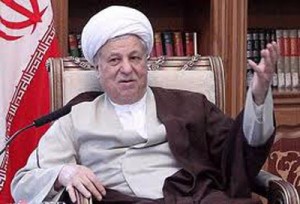 Ali Akbar Hashemi�Rafsanjani says Islamic Republic must safeguard Syria, warns of serious implications 'if the link between Iran and Lebanon is severed.'
Ali Akbar Hashemi�Rafsanjani says Islamic Republic must safeguard Syria, warns of serious implications 'if the link between Iran and Lebanon is severed.'Former Iranian president Ali Akbar Hashemi Rafsanjani said last week that the chances the Syrian regime will survive the current civil war are "slim." Rafsanjani, chairman of the Expediency Discernment Council of Iran (one of the most important councils in the Islamic Republic) said in a meeting with Iraqi delegates that he was worried about the implications a collapse of the Syrian regime may have on the situation in Iraq and elsewhere.
"Syria must not be a factor blocking our way," he said. "We must safeguard Syria. If the chain between Iran and Lebanon is severed there will be serious ramifications."
Several weeks ago, the Iranian supreme leader Ayatollah Ali Khamenei said that the conflict in Syria is also a struggle over Iran itself, and that safeguarding Syria is directly related to the national security of the Islamic Republic. His statements, coupled with Rafsanjani's assessment, may reflect a new mood in Tehran: That the Syrian regime should be treated as a risky asset � one that could damage Iranian influence in Syria and Lebanon.
Rafsanjani, who may run in the presidential election in June, supports direct nuclear negotiations with the U.S., provided they do not "harm Iran's status." Since the elections in 2009 he has been waging a heated public campaign against President Mahmoud Ahmadinejad, and has even come out against Khamenei. This has led to the arrest of two of Rafsanjani's children: His daughter Faezeh, who has been in prison since August and held in solitary confinement for the past month, and his son Mehdi, who was released on bail last month after spending half a year in jail. Both were convicted of "incitement against the regime."
Rafsanjani's statement on Assad's future prospects indicates that senior officers in Iran's Revolutionary Guard have come to the conclusion that Assad is unlikely to come out victorious from the current conflict. According to publications in Iran, the failure to put down the revolt is being blamed on Assad's mismanagement of the conflict and the fact that he has been consistently disregard the advice of their consultants. Khamenei's representative in Syria, Mujatba Hussaini, presented a detailed report on the situation in Syria. The report contains harsh criticism and descriptions of the Syrian government's inability to control the country, rebels taking control of the border crossings and fear that the conflict will spill over into Lebanon and that the ties between the two nations may break. Last week Hussaini left Syria and it isn't clear if he will ever return.
On the other hand, the Major General Seyed Hassan Firuzabadi, Chief of Staff of the Iranian Armed Forces, announced that "The Syrian Army and its militia were in control of all the country's districts despite the rebel's cooperation with the United States and Israel." According to reports by American intelligence agencies, the Syrian government received a shipment of Iranian Fateh-110 rockets, which are more accurate than the Soviet Scuds they had been using in their attacks on Syrian cities and rebel strongholds.
These conflicting reports coupled with the military support Syria is receiving from Iran, indicates, more than anything else, that despite the fact that Iran has yet to decide to change its policy towards Assad, it is trapped in a strategic dilemma: Should they ditch Assad and begin negotiating with the opposition and secure its position in post-Assad Syria, or stick to its traditional policy and continue supporting the Syrian dictator, which would lead to a severe strategic setback if Assad is in fact deposed. Their decision on this is directly linked to Moscow's decision on the same and Iran's assessment of its ability to find a replacement they can work with in a post-Assad Syria.
Russia, which has recently decided to try and open a dialog with the Syrian opposition, is continuing to state that it is not committed to Assad rather to the order and stability in Syria, but had up to now, opposed all proposals for military intervention. The Russian position, like that of the Iranians, stems from a similar dilemma to that facing the Syrians � the question of who rules Syria is only secondary to the question who's client state will Syria be � Will Syria remain a client state of Russia and Iran as it had been up to now or will it become a client state of the U.S. and its allies in Europe. The Syrian opposition's insistence on rejecting talks with Moscow has only pushed Russia to take a more unyielding stance. But the U.S. too cannot be certain that post-Assad Syria would change its allegiances and cross over to the West.
By Haaretz
The Iran Project is not responsible for the content of quoted articles.










